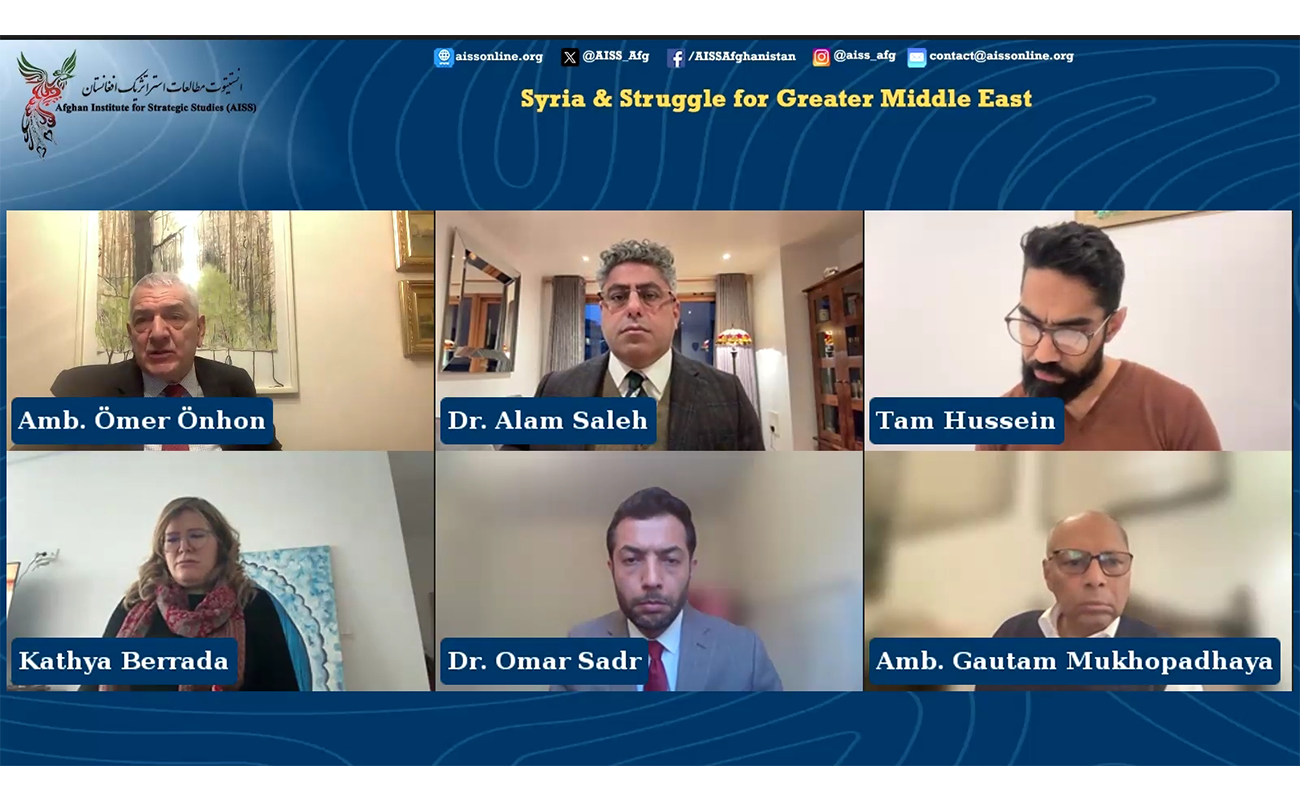Webinar on “Syria & the Struggle for a Greater Middle East”
On December 20, 2024, the Afghan Institute for Strategic Studies (AISS) organized a webinar titled “Syria & the Struggle for a Greater Middle East,” with panelists including former Turkish Ambassador Ömer Önhon, former Indian Ambassador Gautam Mukhopadhaya, journalist Tam Hussein, and researchers Dr. Omar Sadr and Dr. Alam Saleh. The discussion centered on the fall of the Assad regime, the future of governance in Syria, transitional justice, and broader implications for regional and international security.
Moderator Kathya Berrada introduced the discussion by reflecting on Syria’s decade-long conflict and the toll it has taken on its population. Displacement, economic devastation, and human rights atrocities under Assad’s rule have left a nation deeply scarred. Berrada emphasized the need for rebuilding efforts that prioritize democracy, pluralism, and transitional justice.
Geopolitical Implications of Assad’s Fall
Amb. Ömer Önhon described the fall of Assad’s regime as a pivotal moment for Syria and the region. He noted that while the regime’s collapse created opportunities for neighboring nations, the stability of Syria’s emerging governance remains uncertain. Önhon cautioned that the current caretaker government lacks inclusivity, with no representation from women, minority groups, or various opposition factions. He underscored the necessity of establishing a governance model that respects Syria’s multi-ethnic, multi-religious identity.
On the regional front, Önhon highlighted Turkey’s vested interest in ensuring Syria’s territorial integrity, mitigating threats from the Kurdish YPG, and facilitating the safe return of millions of Syrian refugees. He also addressed the shifting roles of Iran and Russia. While both countries have suffered setbacks, particularly Iran, their involvement in Syria’s future remains influential.
A Regional and Historical Perspective
Amb. Gautam Mukhopadhaya framed Syria’s transition as a geopolitical earthquake, likening it to the fall of the Berlin Wall in Europe. He cautioned against premature judgments about the new administration, emphasizing the need to allow time for the dust to settle. Mukhopadhaya raised important questions about the role of external actors, suggesting that covert coordination among Israel, the U.S., and Turkey might have influenced the regime’s collapse.
Mukhopadhaya also addressed broader trends, including the decline of pan-Arabism, the evolution of political Islam, and the weakening of Iran’s “Shia Crescent” strategy. He warned that the fragmentation of Syria could lead to the emergence of ungoverned spaces that foster extremism, a scenario with global security implications.
Challenges for Governance and Justice
Tam Hussein highlighted Damascus's symbolic and strategic significance in the Muslim imagination, emphasizing how its capture by rebel factions has boosted their morale. He expressed concerns about the challenges facing the new administration, particularly the need to reconcile hardline and moderate Islamist factions. Hussein also raised critical questions about the future of ungoverned spaces in Syria and the security risks posed by radicalized individuals in detention camps like al-Hol.
Dr. Omar Sadr explored the potential for transitional justice in Syria. He highlighted the atrocities committed under Assad’s rule, including ethnic cleansing and the systematic use of mass graves. Sadr praised Syrian civil society for its proactive efforts to document human rights violations and pursue justice through mechanisms like universal jurisdiction. However, he stressed the importance of an inclusive approach to governance that prioritizes rights over sectarian or ideological dominance.
Structural Challenges and International Dynamics
Dr. Alam Saleh offered a sobering assessment of Syria’s future, warning that structural divisions—ethnic, sectarian, social, and political—will continue to undermine stability. Saleh described the Syrian conflict as emblematic of broader regional struggles, with competing interests among local and international actors prolonging the crisis. He criticized the lack of viable solutions, arguing that replacing a secular dictatorship with a non-inclusive Islamist regime does little to address Syria’s underlying challenges.
Way Forward
The panelists agreed that Syria’s future remains uncertain. While the fall of the Assad regime offers a glimmer of hope, the road to stability is strewn with obstacles. The international community’s role in supporting transitional justice, rebuilding infrastructure, and fostering inclusive governance will be critical. The discussion underscored the need for sustained engagement, both from regional actors and the global community, to prevent Syria from becoming a breeding ground for extremism and to support its transition toward a pluralistic and democratic society.

